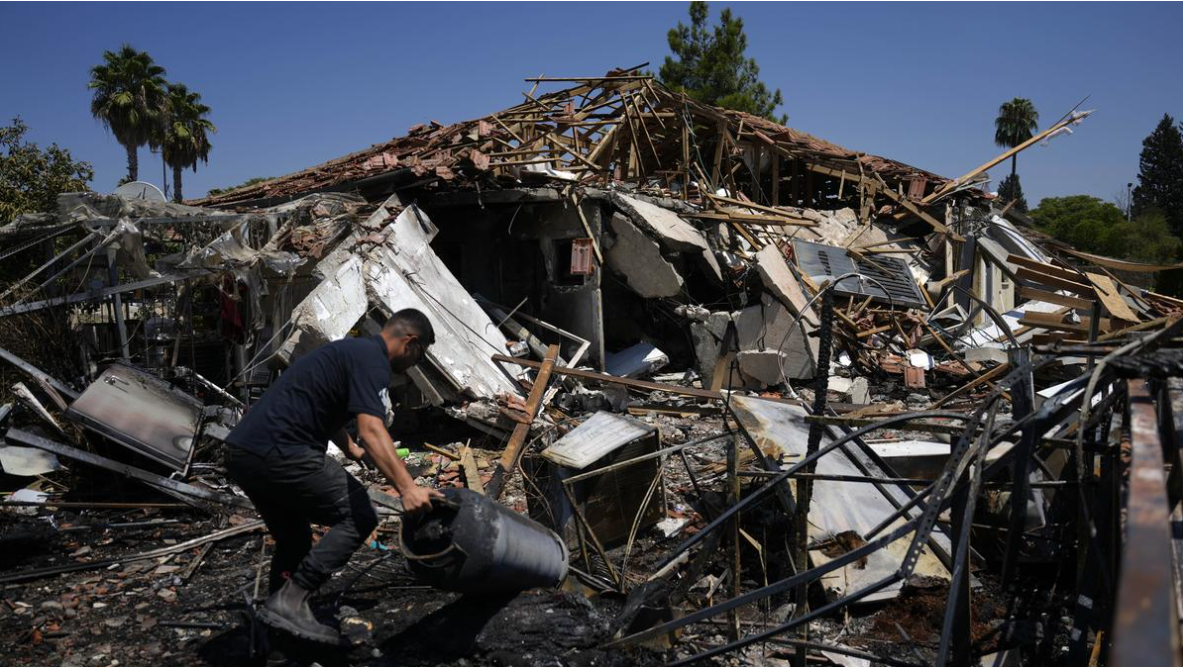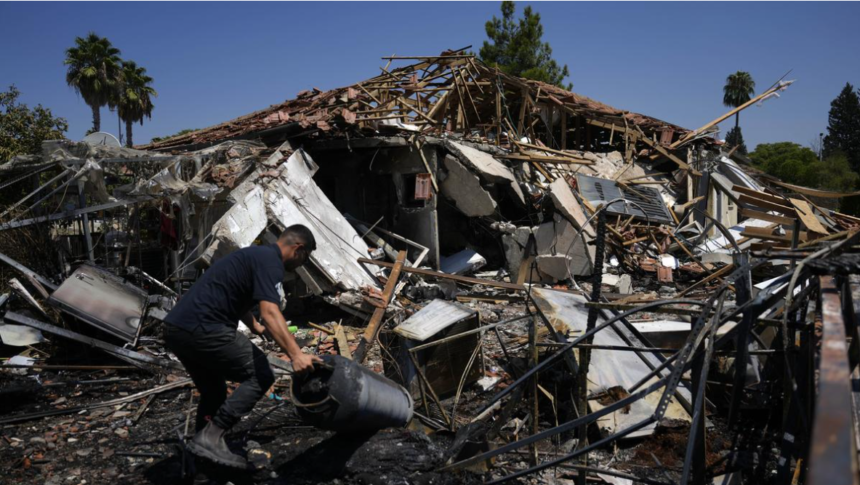Introduction
On August 20, 2024, Hezbollah, the powerful Shiite militant group based in Lebanon, launched more than 50 rockets into the Israeli-annexed Golan Heights. The unprecedented barrage targeted multiple sites within the region, causing significant alarm and marking one of the most serious escalations between the two adversaries in recent years. Hezbollah claimed responsibility for the attack, stating it was in retaliation for an Israeli airstrike deep within Lebanon the previous night that killed one person and injured 19 others.
This article explores the context and implications of this rocket attack, delving into the historical tensions between Hezbollah and Israel, the strategic importance of the Golan Heights, and the broader geopolitical ramifications of this latest flare-up in violence.
Background: Hezbollah-Israel Tensions
Hezbollah and Israel have been locked in a protracted conflict for decades, rooted in deep-seated political, religious, and territorial disputes. Hezbollah was formed in the early 1980s with the support of Iran and Syria as a response to Israel’s invasion of Lebanon in 1982. Since then, the group has grown into a formidable military and political force, with a significant presence in Lebanon’s government and a well-armed militia.
The 2006 Lebanon War
One of the most significant confrontations between Hezbollah and Israel occurred in 2006 during the Lebanon War, which lasted 34 days and resulted in heavy casualties on both sides. The conflict began when Hezbollah fighters crossed into Israel, killed three soldiers, and captured two others, prompting a massive Israeli military response. The war resulted in over 1,200 deaths in Lebanon, mostly civilians, and around 160 deaths in Israel, including both soldiers and civilians. The conflict ended with a United Nations-brokered ceasefire, but the underlying tensions and unresolved issues continued to fester.
Ongoing Skirmishes and Proxy Battles
Since the 2006 war, Hezbollah and Israel have engaged in sporadic skirmishes along the Israel-Lebanon border, with both sides accusing each other of violations. Hezbollah has also been involved in various proxy battles across the Middle East, including in Syria, where it has supported the Assad regime alongside Iran, further complicating its relationship with Israel.
The Israeli Airstrike and Hezbollah’s Retaliation
The immediate trigger for the latest rocket barrage was an Israeli airstrike deep into Lebanese territory on the night of August 19, 2024. According to reports, the strike targeted a Hezbollah weapons depot in the Bekaa Valley, a region known for its strategic importance and Hezbollah’s stronghold. The airstrike resulted in the death of one Hezbollah member and injured 19 others, including civilians, sparking outrage within the organization and among its supporters.
Hezbollah’s leadership swiftly condemned the Israeli action, vowing to retaliate and sending a clear message that such attacks would not go unanswered. Less than 24 hours later, Hezbollah launched over 50 rockets into the Golan Heights, a region that Israel captured from Syria during the Six-Day War in 1967 and later annexed, a move not recognized by the international community.
The Golan Heights: A Strategic Flashpoint
The Golan Heights is a region of critical strategic importance, making it a frequent flashpoint in the Israel-Hezbollah conflict. The region’s elevated terrain provides a military advantage, offering a vantage point over both Israeli and Syrian territory. This strategic significance has made the Golan Heights a key focus of military and geopolitical interest in the region.
Israel’s Annexation and International Response
Israel’s annexation of the Golan Heights in 1981 was met with widespread international condemnation, with the United Nations Security Council passing Resolution 497, which declared the annexation “null and void and without international legal effect.” Despite this, Israel has maintained control over the region, citing security concerns and the need to protect its northern border from potential attacks by Syria or Hezbollah.
The Golan Heights is also home to a significant Israeli civilian population, with several towns and settlements established since the annexation. The region’s proximity to both Lebanon and Syria has made it a frequent target of cross-border attacks, with Hezbollah in particular using it as a battleground in its ongoing conflict with Israel.
The Rocket Attack: Details and Impact
The rocket barrage launched by Hezbollah on August 20, 2024, targeted multiple sites across the Golan Heights, including military installations and civilian areas. According to Israeli authorities, the Iron Dome missile defense system intercepted a number of the rockets, but several managed to hit their targets, causing damage to infrastructure and injuries to civilians.
Israeli Response
In response to the attack, the Israeli Defense Forces (IDF) launched a series of airstrikes targeting Hezbollah positions in southern Lebanon. The IDF also deployed additional troops to the Golan Heights and the Israel-Lebanon border, signaling a potential escalation in the conflict. Israeli Prime Minister Benjamin Netanyahu condemned the rocket attack, stating that Israel would “respond with full force” to any further aggression.
The Israeli government also called on the international community to condemn Hezbollah’s actions, emphasizing the need for continued support in countering the group’s influence in Lebanon and the broader region. The United States, a key ally of Israel, expressed its support for Israel’s right to defend itself and called for restraint on both sides to avoid further escalation.
Hezbollah’s Justification
Hezbollah, for its part, framed the rocket attack as a justified response to Israeli aggression. The group’s leader, Hassan Nasrallah, declared that Hezbollah would continue to defend Lebanon’s sovereignty and resist Israeli occupation, particularly in contested areas like the Shebaa Farms and the Golan Heights. Nasrallah also warned that any further Israeli strikes would be met with an even stronger response, raising the specter of a broader conflict.
The rhetoric from Hezbollah has been backed by widespread support among its base, with many in Lebanon viewing the group as a legitimate resistance movement against Israeli occupation. However, the rocket attack has also drawn criticism from some quarters, including within Lebanon, where there are concerns that Hezbollah’s actions could drag the country into another devastating conflict with Israel.
Regional and Global Repercussions
The latest escalation between Hezbollah and Israel has significant implications not only for Lebanon and Israel but also for the broader Middle East and the international community. 
Potential for Broader Conflict
The rocket attack and subsequent Israeli retaliation have heightened fears of a broader conflict that could draw in other regional players, including Syria and Iran. Both countries have close ties to Hezbollah, with Iran providing significant financial and military support to the group. Any further escalation could potentially lead to a wider regional war, with devastating consequences for the already volatile Middle East.
The involvement of Syria is particularly concerning, given the ongoing civil war in the country and the presence of various militant groups along the Israel-Syria border. The Syrian government, which has historically claimed the Golan Heights as part of its territory, could be drawn into the conflict, either directly or through its support for Hezbollah.
International Diplomacy and Peace Efforts
The international community has responded to the escalation with calls for restraint and renewed efforts to de-escalate tensions. The United Nations has urged both Israel and Hezbollah to avoid actions that could lead to further violence and has called for dialogue to resolve the underlying issues. The European Union has also expressed concern over the potential for a broader conflict and has called for a ceasefire to prevent further civilian casualties.
The United States, while expressing support for Israel’s right to defend itself, has also called for restraint and emphasized the importance of diplomatic efforts to resolve the conflict. The Biden administration has reportedly been in contact with both Israeli and Lebanese officials, as well as other regional players, in an attempt to prevent the situation from spiraling out of control.
Impact on Lebanon’s Domestic Politics
The rocket attack and the subsequent Israeli response have significant implications for Lebanon’s domestic politics. Hezbollah’s actions have once again placed Lebanon at the center of a potential regional conflict, raising concerns about the country’s stability and the potential for further economic and social turmoil.
Lebanon is already grappling with a severe economic crisis, widespread corruption, and political paralysis, all of which have been exacerbated by the ongoing power struggle between Hezbollah and other political factions. The latest escalation could further weaken the Lebanese state and increase the risk of internal conflict, particularly if Hezbollah’s actions provoke a broader Israeli military response.
There is also the risk that the conflict could deepen divisions within Lebanon, particularly between Hezbollah and its political opponents. Some factions within Lebanon have criticized Hezbollah’s actions, arguing that the group is prioritizing its own agenda over the interests of the country as a whole. These internal divisions could complicate efforts to form a stable government and address the myriad challenges facing Lebanon.
The Role of Hezbollah and Iran
Hezbollah’s actions cannot be understood without considering the broader context of its relationship with Iran. Iran has been a key supporter of Hezbollah since its inception, providing financial, military, and logistical support to the group. Hezbollah, in turn, has served as a crucial proxy for Iran in its broader strategy of confronting Israel and expanding its influence in the Middle East.
Iran’s Strategic Interests
For Iran, Hezbollah serves as a key part of its regional strategy, allowing it to exert influence in Lebanon and beyond while maintaining a credible deterrent against Israel. Iran’s support for Hezbollah is also part of its broader effort to challenge U.S. and Israeli influence in the region, particularly in the context of the ongoing nuclear standoff and the broader struggle for dominance in the Middle East.
Iran’s support for Hezbollah has also allowed it to project power in Syria, where Hezbollah fighters have played a crucial role in supporting the Assad regime. This involvement in Syria has further strengthened the alliance between Iran, Hezbollah, and the Syrian government, creating a powerful axis of resistance against Israel and its allies.
The Risks of Escalation
However, Iran’s support for Hezbollah also carries significant risks. Any escalation in the conflict between Hezbollah and Israel could potentially draw Iran into a direct confrontation with Israel, with unpredictable and potentially devastating consequences for the region. Iran’s involvement in a broader conflict could also provoke a strong response from the United States and its allies, potentially leading to a wider regional war.
The risks of escalation are particularly high given the current geopolitical climate, with tensions between Iran and the United States at a near-breaking point following the collapse of the nuclear deal and the re-imposition of U.S. sanctions on Iran. Any further escalation in the Hezbollah-Israel conflict could be seen as a proxy for the broader struggle between Iran and its adversaries, with potentially catastrophic consequences for the region.
Conclusion
The rocket barrage launched by Hezbollah into the Israeli-annexed Golan Heights on August 20, 2024, marks a significant escalation in the long-standing conflict between the group and Israel. The attack, which Hezbollah claims was in response to an Israeli airstrike that killed one of its members, has heightened fears of a broader conflict that could draw in other regional players, including Syria and Iran.
The situation remains tense, with both sides warning of further retaliation and the international community calling for restraint. The outcome of this latest escalation will have significant implications not only for Israel and Lebanon but also for the broader Middle East and the international community.
As the situation continues to unfold, it is crucial that all parties involved prioritize diplomacy and seek to resolve the underlying issues that have fueled this conflict. The stakes are high, and the potential consequences of further escalation are dire. The international community must work together to prevent this conflict from spiraling out of control and to ensure a peaceful and stable future for the region. ALSO READ:- Sheikh Hasina Faces 33 Cases, Including Murder Charges, After Ouster from Bangladesh: A Complex Political Battle





